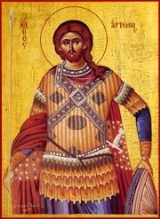
Artemius
Encyclopedia
Artemius known as Challita in the Maronite tradition, was a general of the Roman Empire
, dux Aegypti (imperial prefect of Roman Egypt
). He is considered a saint by the Orthodox Church, with the name of Artemius of Antioch,
Christian, as Emperor Constantius II
was. Constantius ordered Artemius to go in the lands beyond the Danube
and to bring back to Constantinople
the relics of Andrew the Apostle, Luke the Evangelist
and Saint Timothy. Artemius accomplished his task and was rewarded with the appointment to the rank of dux Aegypti (360).
One year later Constantius was succeeded by his cousin Julian, who was a Pagan. The people of Alexandria accused Artemius of several atrocities, and Julian condemned him to death. Artemius was beheaded in 363 in the city of Antioch
, where he had been recalled by Emperor Julian the Apostate for maladministration of his province. The charges stemmed from his persecution of pagans in Alexandria
, and his use of troops in the seizure and despoliation of the Temple of Serapis
instigated by George of Cappadocia
. According to Ammianus Marcellinus, his death encouraged the people of Alexandria to kill George , but this information is probably false, because George was already dead before his trial.
Roman Empire
The Roman Empire was the post-Republican period of the ancient Roman civilization, characterised by an autocratic form of government and large territorial holdings in Europe and around the Mediterranean....
, dux Aegypti (imperial prefect of Roman Egypt
Aegyptus (Roman province)
The Roman province of Egypt was established in 30 BC after Octavian defeated his rival Mark Antony, deposed his lover Queen Cleopatra VII and annexed the Ptolemaic kingdom of Egypt to the Roman Empire. The province encompassed most of modern-day Egypt except for the Sinai Peninsula...
). He is considered a saint by the Orthodox Church, with the name of Artemius of Antioch,
Biography
Artemius was an ArianArianism
Arianism is the theological teaching attributed to Arius , a Christian presbyter from Alexandria, Egypt, concerning the relationship of the entities of the Trinity and the precise nature of the Son of God as being a subordinate entity to God the Father...
Christian, as Emperor Constantius II
Constantius II
Constantius II , was Roman Emperor from 337 to 361. The second son of Constantine I and Fausta, he ascended to the throne with his brothers Constantine II and Constans upon their father's death....
was. Constantius ordered Artemius to go in the lands beyond the Danube
Danube
The Danube is a river in the Central Europe and the Europe's second longest river after the Volga. It is classified as an international waterway....
and to bring back to Constantinople
Constantinople
Constantinople was the capital of the Roman, Eastern Roman, Byzantine, Latin, and Ottoman Empires. Throughout most of the Middle Ages, Constantinople was Europe's largest and wealthiest city.-Names:...
the relics of Andrew the Apostle, Luke the Evangelist
Luke the Evangelist
Luke the Evangelist was an Early Christian writer whom Church Fathers such as Jerome and Eusebius said was the author of the Gospel of Luke and the Acts of the Apostles...
and Saint Timothy. Artemius accomplished his task and was rewarded with the appointment to the rank of dux Aegypti (360).
One year later Constantius was succeeded by his cousin Julian, who was a Pagan. The people of Alexandria accused Artemius of several atrocities, and Julian condemned him to death. Artemius was beheaded in 363 in the city of Antioch
Antioch
Antioch on the Orontes was an ancient city on the eastern side of the Orontes River. It is near the modern city of Antakya, Turkey.Founded near the end of the 4th century BC by Seleucus I Nicator, one of Alexander the Great's generals, Antioch eventually rivaled Alexandria as the chief city of the...
, where he had been recalled by Emperor Julian the Apostate for maladministration of his province. The charges stemmed from his persecution of pagans in Alexandria
Alexandria
Alexandria is the second-largest city of Egypt, with a population of 4.1 million, extending about along the coast of the Mediterranean Sea in the north central part of the country; it is also the largest city lying directly on the Mediterranean coast. It is Egypt's largest seaport, serving...
, and his use of troops in the seizure and despoliation of the Temple of Serapis
Serapis
Serapis or Sarapis is a Graeco-Egyptian name of God. Serapis was devised during the 3rd century BC on the orders of Ptolemy I of Egypt as a means to unify the Greeks and Egyptians in his realm. The god was depicted as Greek in appearance, but with Egyptian trappings, and combined iconography...
instigated by George of Cappadocia
George of Laodicea
George of Laodicea was a philosopher from Alexandria, involved in the debate over the doctrine of the Trinity.-References:...
. According to Ammianus Marcellinus, his death encouraged the people of Alexandria to kill George , but this information is probably false, because George was already dead before his trial.
Hagiography
He is recognized as a saint for his martyrdom; his feast day was set as 20 October.External links
- Artemius in the Catholic Forum.
- Artemius in the Orthodox Church in America
- October 20 in the Synaxarion.

